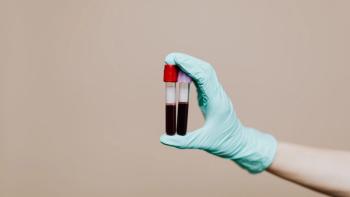
Supportive Care Options for Patients with Multiple Myeloma

Transcript:
Kristie L. Kahl: Can you just discuss some of the medical issues, like bone damage, fatigue, renal renal issues or anemia, associated with multiple myeloma?
Amy Pierre: The medical issues that are associated with multiple myeloma are really directly related to the effects that the monoclonal proteins have on the body itself. So, these abnormal plasma cells overcrowd the bone marrow, not allowing the bone marrow to do its natural job
of producing your blood cells, specifically your white blood cells and red blood cells. If you have low red blood cells, that causes anemia. We know that the most common presenting symptom of myeloma is anemia, which, in turn, can make people feel very fatigued. The most common physical presenting symptom, aside from the fatigue, is bone pain. The bone pain occurs because the myeloma cells actually upregulate cells in your body called osteoclasts that break down the bone. This imbalance causes issues where the bones become more brittle. They become weaker and easy to fracture without any sort of direct trauma to the bone. These fractures and lytic lesions we can see cause a lot of pain and discomfort for patients, so that's an issue that patients have. Also, this kind of widespread bone destruction can cause the calcium to leach out of the bones into the bloodstream and that's called hypercalcemia, or high calcium levels in the blood. That can make patients feel unwell, too. That can make people have a low appetite, make them feel tired, even a little nauseous or constipated. Sometimes it can even make patients feel a little confused. And the high calcium levels in the blood are actually really toxic to the kidneys, which compounds the issue that these myeloma cells are also toxic to the kidneys. So, there are a lot of body systems that can be affected by the myeloma and can cause a lot of different symptoms and medical issues. Some of these issues can be directly related to each other as well.
Kristie L. Kahl: How does the disease affect the bone marrow?
Amy Pierre: So, the bone marrow really is the primary focus of myeloma disease progression. There's properties in the bone marrow microenvironment that allow for infiltration and growth and proliferation and even migration of the myeloma cells itself. The bone marrow microenvironment has these inflammatory molecules that can actually play a big role in supporting the growth of myeloma cells and also play a role in drug resistance, too.
So, as the myeloma cells proliferate and overcrowd the bone marrow space, we can see lowered healthy white blood cells, lowered red blood cells; therefore, the immune system becomes inherently compromised and patients become anemic.
Kristie L. Kahl: Are there any other issues surrounding the immune system that patients should be aware of?
Amy Pierre: Overproduction of these monoclonal antibodies are really not functional and not helpful for the immune system. It can also cause suppression of your normal immunoglobulins and that leads to a compromised immune system. So, myeloma patients are particularly susceptible to what we call encapsulated bacteria. These bacteria are in charge of producing respiratory infections like streptococcus, pneumonia, Hemophilus influenza. Treatment of the myeloma itself can compromise the immune system so it's really important for myeloma patients to protect themselves from infection. That’s practicing good infection precautions such as good hand hygiene, good oral hygiene, avoiding sick contacts and obtain vaccinations as directed by your providers.
Now, in terms of COVID-19, we know that patients who are at high risk for complications from COVID-19 are those who are above the age of 65, those who are immunocompromised and those with chronic kidney issues, amongst other many other risk factors. But those three alone that I just described are clear descriptions of the majority of myeloma patients:over the age of 65, immunocompromised. It's really important for myeloma patients to minimize their exposure to COVID-19, wash their hands really well, clean frequently touched areas, practice, social distancing, wearing face coverings when they're around others.
Kristie L. Kahl: How likely are these issues to occur, and what can patients look out for?
Amy Pierre: Myeloma patients, compared to the general population, because of their compromised immune system, are seven times more likely to get an infection. And once they start treatment, that increases to 11-fold. Infections can be very serious in myeloma patients. They need to report fevers, shaking, chills. Even without a fever, if they have a very low blood pressure, they're feeling short of breath, they have a cough, dizziness, anything unusual should really prompt evaluation and care.
With renal insufficiency, about 20% of patients who have myeloma present with abnormal kidney function at diagnosis and about 60% present with anemia at diagnosis. In terms of the high calcium levels, about 10% to 15% of patients have that in diagnosis but develop it. For the bone disease, we see about 85% of patients develop bone disease throughout their disease trajectory.
Kristie L. Kahl: Can you describe some of the treatments that are available for patients if they are experiencing any of these medical issues?
Amy Pierre: Specifically for infection, we know that the best form of treatment is really prevention. With the appropriate infection precautions that we just discussed and also certain antimicrobials are important. For example, there are certain myeloma therapies that can increase your risk of developing certain infections like herpes zoster or shingles and so it's really important for patients to be on antiviral medications to lower this risk.
If patients are neutropenic (really low neutrophils, which is a particular type of white blood cell that's your first line of defense against an infection), you're really susceptible to catching a bad infection and harder to fight it off. Patients who are neutropenic, we can give them growth factor support with injections to help boost their neutrophil count to avoid what we call a neutropenic event.
Vaccinations are also important. Patients should be receiving their seasonal influenza vaccine, their pneumothorax, their pneumococcal vaccine. And, of course, if they get a stem cell transplant, they're going to need to get their post-t transplant vaccination series. there's also the recombinant zoster vaccine that we have available now that patients can receive if it's recommended by their provider.
For the electrolyte imbalances like the hypercalcemia and also the bone lesions, we use bone modifying agents. Those are really important to decrease the likelihood of these skeletal-related events. It can help improve the bone integrity for patients and decrease these high calcium levels.
Then the bone pain that we see with myeloma can really compromise the quality of life for patients. So, pain control really needs to be optimized and there are several things we can do for that. There's prescription medications; surgical interventions; if patients have compression fractures, we can offer kyphoplasty or vertebroplasty; radiotherapy, if it's appropriate; and even complementary alternative medicines such as acupuncture.
In terms of the anemia, if we have anemia associated with diagnosis most often the anemia can actually correct itself once patients are on treatment because we're cleaning out that bone marrow from all that myeloma. But if the anemia persists, ruling out other causes of the anemia are really important. Nutritional deficiencies like iron deficiency, B12 deficiency, folate – we need to look for that. If there's blood loss from bleeding or even hemolysis, we need to look for that. Sometimes. endocrine problems like hypothyroidism can be responsible for anemia and if the patient's really anemic, they may warrant a blood transfusion. That will help improve the oxygen-carrying capacity for the patient.
Fatigue is probably the most difficult side effect that patients experience. It's really multi-bacterial. It's related to the disease itself, anemia, the treatment or even emotional issues such as depression. Exercise, proper rest, psychosocial support, good nutrition, transfusions, if they need it, and even certain medications can be beneficial for the fatigue to alleviate the underlying issue. If it’s truly something like depression or even insomnia, there's a variety of ways we can manage these medical issues for our myeloma patients to really maintain good quality of life.
Kristie L. Kahl: Are there other types of supportive care that's available for patients?
Amy Pierre: I’mreally a huge believer in support groups. Myeloma is relatively rare. It only makes up about less than 2% of the population. So, it's really hard to meet another myeloma patient unless you're in the waiting room, sometimes you might meet one but it's really nice to be around your peers and share experiences – see what works for them, what didn't work for them. It’s really helpful for patients to participate in support groups if that works for them.
There's also several organizations such as the MMRF that have wonderful resources for patients and caregivers to learn how best to live well with myeloma. It’s becoming more of a chronic disease. Also, the MMRF helps to find out what the latest updates are regarding treatment of multiple myeloma and other supportive care resources.
Kristie L. Kahl: What is your biggest piece of advice for a patient who may be experiencing any of these medical issues throughout their treatment or their diagnosis?
Amy Pierre: I always tell patients to keep a symptom diary. Not every center has intake sheets where they ask specific questions about symptoms so it's really important for the patient to advocate for themselves and write this down. It's very easy to go to your provider's visit and forget to mention all the stuff that you were experiencing a week or two ago before you saw them. So, it's really important to have a symptom diary. Write the symptoms down, if you are taking medications or certain interventions that are recommended by your provider to alleviate their symptoms. If it’s not working, you know record that, document it. Did it help a little bit?Did it help a lot? Did not help at all? It's really important for you and the provider to understand how you're experiencing these symptoms and what interventions we're doing that could be beneficial or not beneficial because we might need to try something else. And if it's related to treatment, we might actually need to dose reduce your treatment to improve toxicity but not reduce efficacy.
Transcription edited for clarity.



